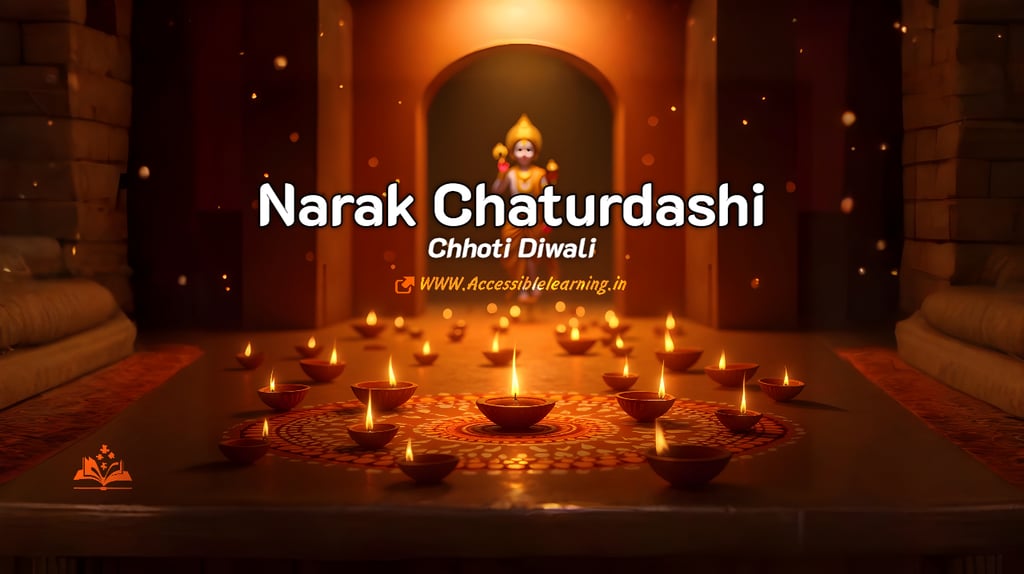
Narak Chaturdashi: The Festival of Light’s Triumph Over Darkness
Discover the significance of Narak Chaturdashi, also known as Chhoti Diwali. Explore its myths, rituals, regional traditions, and modern relevance while uncovering the deeper meaning of light’s triumph over darkness.
CULTURE/TRADITIONINDIA/BHARATCELEBRATION/FESTIVALS
Keshav Jha
10/12/20253 min read


Among the five glorious days of Diwali celebrations, Narak Chaturdashi—also known as Chhoti Diwali, Kali Chaudas, or Roop Chaudas—holds a special place. While Diwali symbolizes the grand victory of light over darkness, Narak Chaturdashi focuses on personal purification, spiritual cleansing, and the triumph of good over evil within oneself. Celebrated on the 14th day of Krishna Paksha (waning phase of the moon) in Kartik month, it falls just a day before the grand Diwali festival.
But this isn’t just about lighting diyas—it is about banishing negativity, honoring ancient traditions, and preparing for renewal.
The Mythological Significance
The stories behind Narak Chaturdashi make it much more fascinating than a ritualistic observance.
The Legend of Narakasura
Narakasura, a mighty demon king, was known for his cruelty and oppression. He imprisoned thousands of women and spread terror across the three worlds.
Krishna Ji, with the help of his consort Satyabhama, killed Narakasura on this day, freeing the captives and restoring peace.
This event marked the end of darkness (Narak) and the rise of justice, giving the festival its name: Narak Chaturdashi.
The Ritual of Abhyanga Snan
According to another belief, Yamraj, the God of Death, granted that anyone who bathes with oil and ubtan before sunrise on Narak Chaturdashi would be freed from untimely death and attain prosperity.
Hence, the oil bath before sunrise remains one of the most important rituals of this day.
Key Rituals and Traditions
Unlike Diwali’s grandeur, Narak Chaturdashi is more personal and intimate.
Abhyanga Snan (Holy Bath)
People wake up before sunrise, apply sesame oil or herbal ubtan, and bathe. This is symbolic of washing away sins, impurities, and negative energies.
Lighting Diyas
Diyas are lit not just in homes but also outside, particularly at the entrance, to ward off evil spirits and invite positivity.
Offerings to Yama (Deepdaan)
In some regions, small lamps are offered facing south in honor of Yama Ji, seeking protection from premature death.
Kali Puja / Hanuman Puja
In western India, Narak Chaturdashi is associated with Kali Chaudas, where people perform tantric rituals to destroy negativity.
In other regions, Hanuman Puja is performed for courage, strength, and protection.
Beauty & Roop Chaudas
In parts of North India, women observe Roop Chaudas, applying herbal face packs, oils, and traditional beauty treatments. The ritual isn’t vanity—it signifies self-care and inner radiance before Diwali.

Narak Chaturdashi Across India
The charm of Narak Chaturdashi lies in its regional diversity:
Maharashtra & Goa—The day is celebrated with early morning abhyanga snan, cracking of firecrackers, and special sweets like karanji and ladoo.
Gujarat—Known as Kali Chaudas, people perform cleansing rituals, prepare special feasts, and ward off evil influences.
South India—It is observed with oil baths, new clothes, and bursting of crackers, marking it as the beginning of Diwali festivities.
North India—Popular as Roop Chaudas, with emphasis on beauty and spiritual cleansing rituals.
The Deeper Symbolism
Narak Chaturdashi is not just about legends—it has a psychological and spiritual essence:
Destroying Inner Demons—Just like Narakasura, humans too face demons of anger, greed, jealousy, and ego. The day reminds us to conquer these negative traits.
Cleansing for Renewal—The oil bath represents detoxification and rebirth, preparing body and soul for the prosperity of Diwali.
Light in Darkness—The diyas symbolize hope, guidance, and positive energy amidst chaos and uncertainty.
Modern Relevance of Narak Chaturdashi
In today’s fast-paced life, Narak Chaturdashi offers lessons that are more relevant than ever:
Emphasizing mental cleansing along with physical hygiene.
Practicing self-care and wellness rituals rooted in Ayurveda.
Understanding the value of letting go of negativity before embracing new beginnings.
Fostering gratitude, protection, and positivity for family and society.
Interesting Facts about Narak Chaturdashi
In Goa, effigies of Narakasura are created and burnt at dawn to symbolize the victory of good over evil.
It is believed that failing to take the abhyanga snan may invite bad luck or misfortune in the coming year.
Some communities also consider it as a day of remembrance, offering prayers for ancestors’ peace.
The festival combines spiritual rituals with health practices, making it unique among Diwali festivities.
FAQs
Q. Why is Narak Chaturdashi called Chhoti Diwali?
Because it is celebrated a day before the main Diwali festival, with smaller-scale rituals and festivities.
Q. What is the difference between Narak Chaturdashi and Diwali?
Narak Chaturdashi focuses on purification and victory over evil (Narakasura), while Diwali celebrates Lord Rama’s return to Ayodhya and the broader victory of light over darkness.
Q. Can non-Hindus observe Narak Chaturdashi rituals?
Yes. The rituals like cleansing baths, lighting diyas, and self-care, have universal significance for wellness and positivity.
Q. Is Narak Chaturdashi celebrated the same way everywhere?
No. It varies regionally—Kali Chaudas in Gujarat, Roop Chaudas in North India, and Naraka Nivaran rituals in South India.
Q. Why is oil used in the Abhyanga Snan?
Oil massage detoxifies, improves circulation, nourishes skin, and symbolizes the cleansing away of sins and negativity.
Narak Chaturdashi is more than a festival—it’s a spiritual reset button. It blends myth, ritual, wellness, and self-awareness into a single day of purification. While Diwali dazzles with grandeur, Narak Chaturdashi teaches us to conquer inner demons, embrace positivity, and prepare for new beginnings.
As diyas glow and the fragrance of ubtan fills the air, the festival whispers a timeless truth: before you light the world, cleanse your soul.
Subscribe To Our Newsletter
All © Copyright reserved by Accessible-Learning Hub
| Terms & Conditions
Knowledge is power. Learn with Us. 📚


